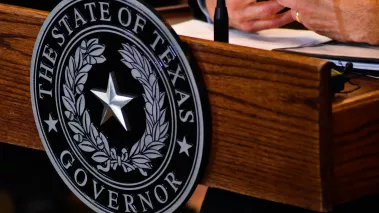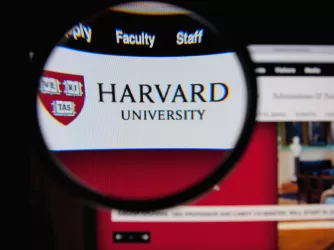Table of Contents
Gov. Greg Abbott’s order ‘hardening state government’ against China is dangerously hard to parse

Carrington Tatum / Shutterstock.com
This week, Texas Gov. Greg Abbott issued an executive order to protect “critical infrastructure, intellectual property, and personal information” from “hostile foreign nations.” It commands state agencies, including Texas’s public universities, to “harden state systems” against the Chinese government.
The wording of the order is unclear and open to interpretation that would be deeply damaging to free speech and academic freedom in the state of Texas. It warns:
No personnel of a state agency controlled by gubernatorially appointed heads, or of public institutions of higher education, shall accept any gift, regardless of value, from an entity associated with or travel to, for professional purposes, a country on the U.S. Department of Commerce’s foreign adversaries list under 15 C.F.R. § 791.4 All agencies and public institutions of public higher education affected by this order shall include this prohibition in their ethics policies and create a mechanism by which their employees can report being approached by groups representing these countries, that offer gifts or travel, or alleged violations of this ethics policy.
Abbott’s press release for the order promises to “[p]rohibit state employees from accepting gifts from or work-related travel to foreign adversary countries.”
The order is presumably intended to ban the acceptance of gifts, including travel, from foreign adversaries or entities associated with them. More on that below. The order would reach China, Iran, North Korea, and other “foreign adversaries,” though it is especially focused on threats emerging from China.
But the order is imprecise and vague, and could be interpreted to ban personnel — in this case, faculty at public universities in Texas — from simply traveling to China in their professional capacities, regardless of who paid to get them there. That would preclude conducting research, giving talks, attending conferences, and conferring with other academics.
This sounds more like the type of measure that would be imposed by China, not about China.
The Chinese government would not allow an American historian to freely discuss the Tiananmen Square killings at a speech in Beijing — and, if Abbott’s order is interpreted as loosely as it’s written, Texas might not, either.
Now you might be thinking: “Though the order is worded in a way that could be construed as a heavy-handed ban on faculty travel to China, no one will actually interpret it that way.” But FIRE has already seen social media discussion among academics who are confused by the meaning and intent of the order, and some who are indeed interpreting it as a blanket professional travel ban.
And, more importantly, we just need to look at how often university administrations overinterpret and overcomply with state legislation and orders to the detriment of faculty rights.
In response to Idaho’s 2021 No Public Funds for Abortion Act, the University of Idaho implemented the law by issuing an unconstitutional policy limiting professors’ ability to discuss abortion and contraception in the classroom. That same year, Iowa State University aggressively overcomplied with a state law concerning “divisive concepts” in “mandatory staff or student training” by warning faculty that the law applied to classroom instruction.
And in Texas itself, just this month, the University of North Texas announced it will monitor teaching and research to comply with a 2023 state law governing DEI initiatives despite its explicit carveout for “academic course instruction” and “scholarly research or a creative work.”
Even when faced with more clearly defined laws and language than that of Abbott’s executive order, universities will overcomply. If he does not intend for this order to be understood as a ban on professional travel, Abbott must clarify that immediately.
But even if Abbott does issue that much-needed clarification, it does not eliminate all the concerns posed by this order. On its face, it appears to disallow academics at public institutions from giving lectures, talks, or attending conferences in their fields in China and Hong Kong if the host institutions pay for travel. That would presumably extend to invitations offered by Chinese universities and academic departments.
The burden this imposes on academics, and the limits it places on the sharing of ideas across borders, are similar to those we’ve warned are posed by academic boycotts. As FIRE President and CEO Greg Lukianoff has previously written:
Academic freedom is a vast and majestic idea that relies on open communication across lines of difference in a global system of checking, arguing, researching, collaborating, and competing to produce better ideas. It’s a critical part of the way we come by new knowledge, creative solutions, and novel perspectives. The idea that a college might ban its scholars from working with scholars of a particular nationality or who work in a particular country in the name of opposing that country’s government is incompatible with this open, liberal system. It’s also foolhardy on any number of levels, including the fact that individual professors’ opinions often in no way reflect or even oppose the policies of their own governments.
But that’s not all. The order goes even further, setting out alarming reporting requirements for faculty members’ personal travel.
Public institutions, along with other state agencies, will be required to “create processes by which their employees will notify the agency of any personal travel to a foreign-adversary nation prior to their travel and submit a post-travel brief outlining details of the trip, including the dates and purpose of travel, to their employer.”

Texas tramples First Amendment rights with police crackdown of pro-Palestinian protests
News
More than 50 arrested after state police storm protestors at University of Texas at Austin.
It’s difficult to see a valid justification for this measure, which goes far beyond any reasonable requirements to report foreign gifts or payments. It sends the message to academics at Texas’ public universities that the government is surveilling them, even in their free time. This sounds more like the type of measure that would be imposed by China, not about China.
Faculty with family in China will likely be hardest hit by this provision and will even be required to give advance notice when they travel home just to celebrate a parent’s birthday — and presumably inform their bosses what kind of dinner they ate to celebrate it when they return to Texas. This is an overreach, and a chilling one at that.
Despite the many problems with this order, I share the governor’s fears about the role the Chinese government plays in U.S. higher education and how the CCP has, successfully at times, sought to limit the freedoms we treasure in American higher education. So much so, in fact, that I’ve been working on a book to be released next year, “Authoritarians in the Academy,” that will detail the pernicious influence authoritarian countries like China have on campus.
Indeed, it’s because I share Gov. Abbott’s concerns about the Chinese government that I also have concerns about this executive order. I cannot imagine a worse way to challenge authoritarianism than by adopting some of its tactics.
Keep Texas institutions free from all authoritarian measures, whether foreign or domestic.
Recent Articles
FIRE’s award-winning Newsdesk covers the free speech news you need to stay informed.

‘I hate freedom of opinion’ meme leads to sentencing in German court

Revoking Harvard’s tax-exempt status will threaten all nonprofits

Grandpa’s advice for the new wave of American censors


